英语八年级上鲁教版(五四制)Unit 1 Could you please clean your room?Section A Period Two 课件(30张)
文档属性
| 名称 | 英语八年级上鲁教版(五四制)Unit 1 Could you please clean your room?Section A Period Two 课件(30张) | 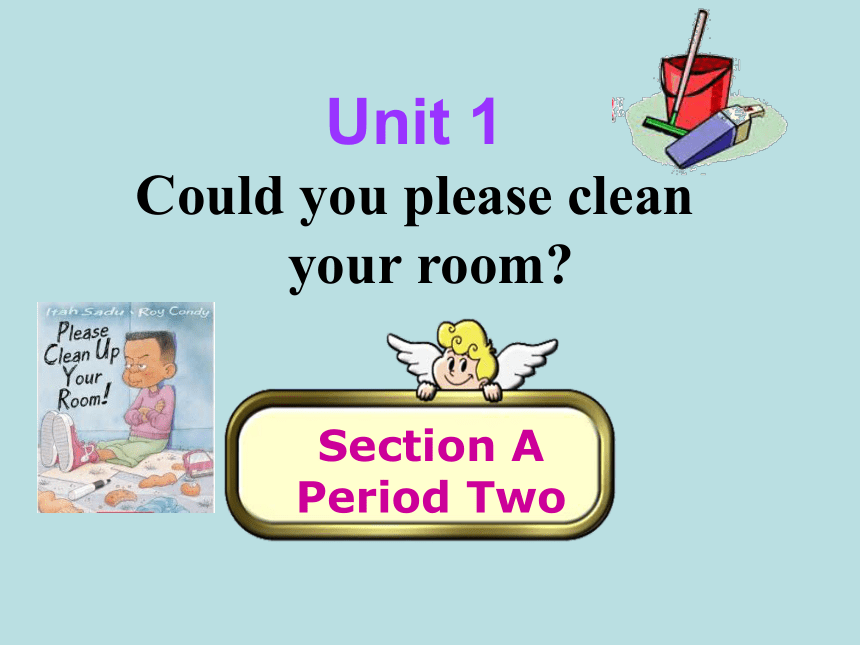 | |
| 格式 | zip | ||
| 文件大小 | 946.0KB | ||
| 资源类型 | 教案 | ||
| 版本资源 | 鲁教版 | ||
| 科目 | 英语 | ||
| 更新时间 | 2017-08-17 08:34:52 | ||
图片预览



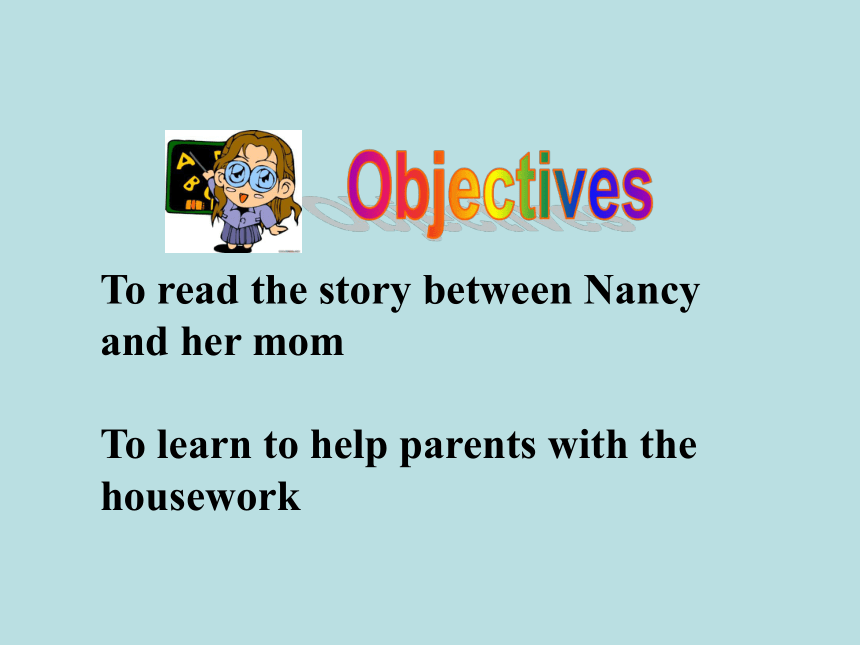

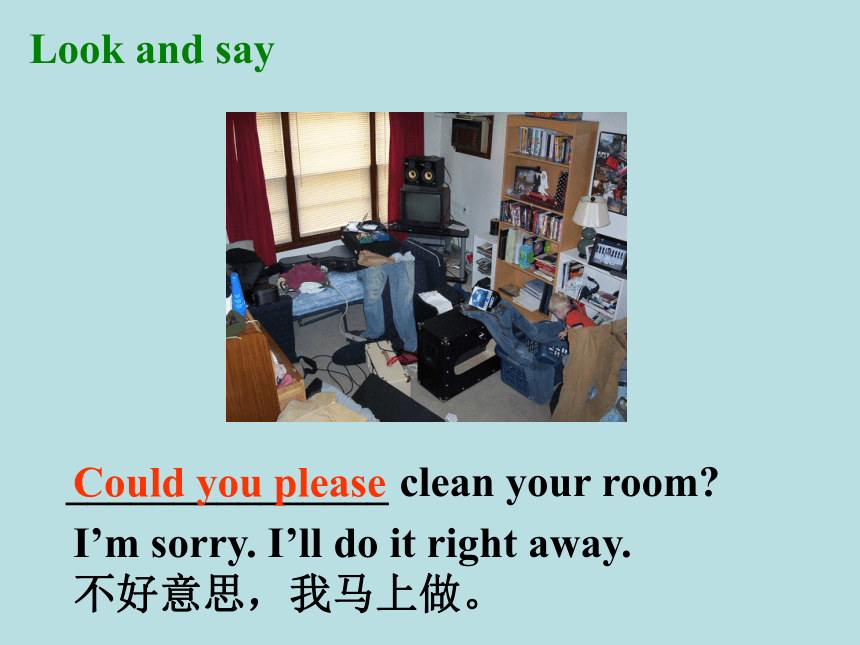
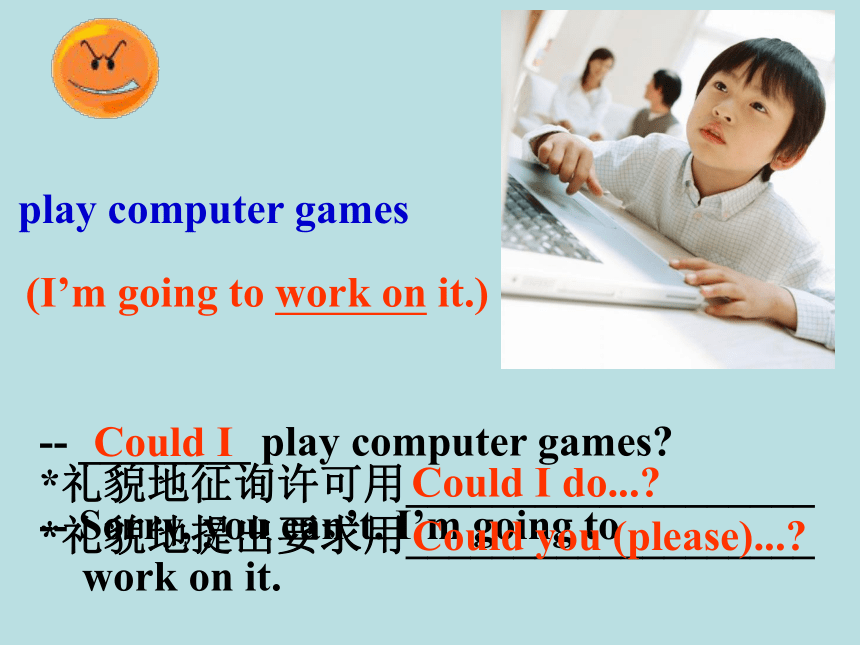


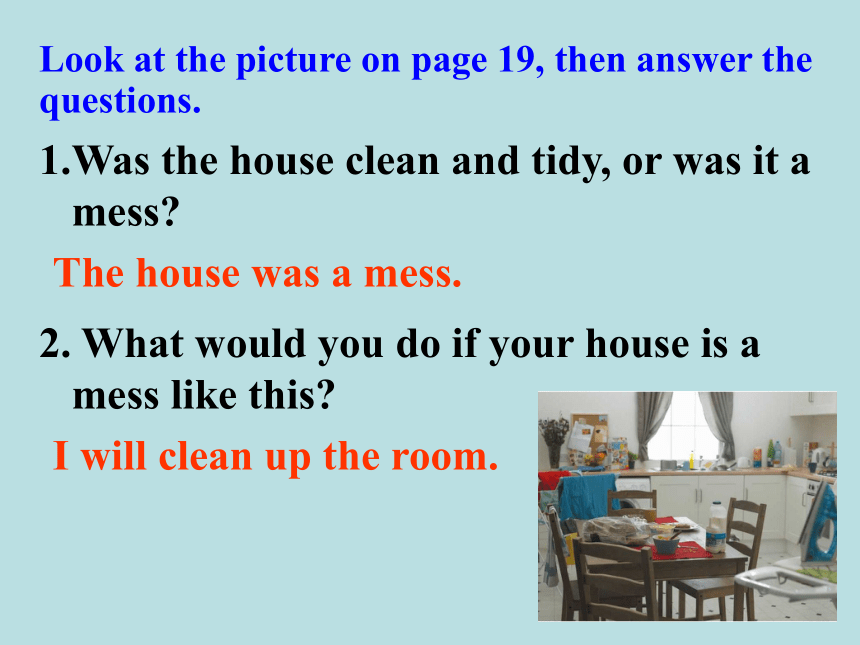
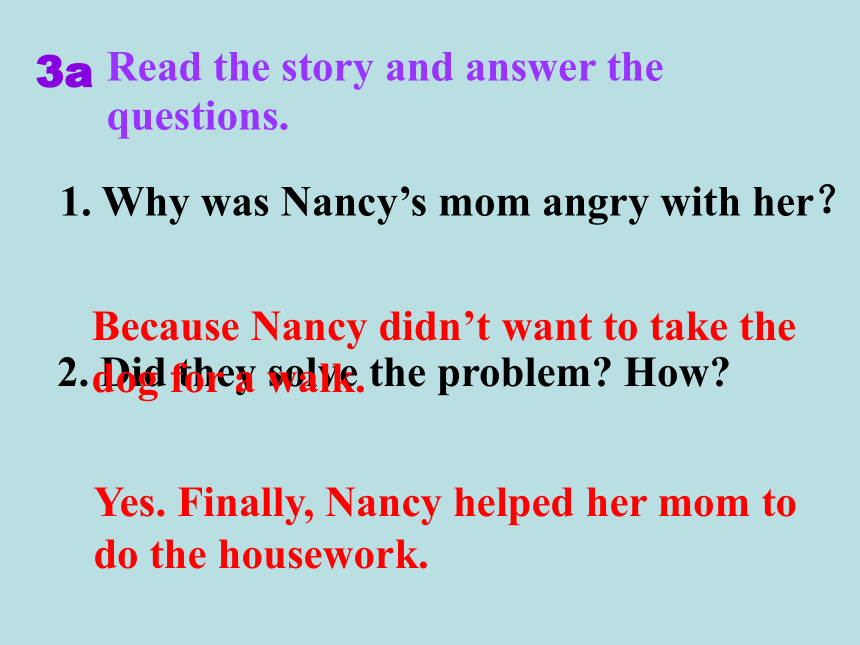

文档简介
课件30张PPT。Unit 1
Could you please clean your room?throw
all the time
neither
shirt
as soon asv. 扔;掷
频繁;反复
adv. 也不
n. 衬衫
一……就……;尽快ObjectivesTo read the story between Nancy and her mom
To learn to help parents with the houseworkneitheras soon asshirtall the timethrowLook and say_______________ clean your room?I’m sorry. I’ll do it right away.
不好意思,我马上做。Could you please(I’m going to work on it.)play computer games-- ________ play computer games?-- Sorry, you can’t. I’m going to
work on it.Could I*礼貌地征询许可用___________________
*礼貌地提出要求用___________________Could I do...? Could you (please)...?Some ideas on doing housework in different countries.*中小学生是否应该帮助家长做家务:世界各国教育界讨论的热门话题之一
*哈佛大学调查显示:美国小学生每日平均劳动1.2小时
*结论:爱做家务的孩子和不爱做家务的孩子相比,长大后失业率为1:15,犯罪率为1:10,平均收入高出20%,离异率,心理疾病患病率较低*孩子帮助家长从事适当的家务劳动:可以增强责任感,培养动手能力,观察能力,有利于家庭成员之间的沟通和理解,增强耐心和坚持不懈的精神Was the house clean and tidy, or was it a mess?Look at the picture on page 19, then answer the questions.The house was a mess. 2. What would you do if your house is a mess like this?I will clean up the room. 3aRead the story and answer the questions. Why was Nancy’s mom angry with her?
2. Did they solve the problem? How?
Because Nancy didn’t want to take the dog for a walk.Yes. Finally, Nancy helped her mom to do the housework.3bRead the sentences below. Underline the sentences from the reading that mean the same thing. Neither of us did any housework for a week.
2. My mom came over as soon as I sat down in front of the TV.
3. You’re tired, but I’m tired, too.
For one week, she did not do any housework and neither did I.The minute I sat down in front of the TV, my mom came over.I’m just as tired as you are!What did Nancy’s mother want her to do?Read the passage carefully and answer the questions.Her mother wants her to take the dog for a walk. 2. What did Nancy want to do?She wants to watch a TV show first. 3. What does Nancy’s mother do during the day? And what does she have to do in the evening?Her mother does work all day and does housework all evening. 4. What was the result when neither Nancy nor her mother did any housework for a week?Finally Nancy could not find a clean dish or a clean shirt. 5. What did Nancy finally understand?She finally understands that children need to share the housework to have a clean and comfortable home. Nancy’s mother was tired and angry with Nancy, for When Nancy got home from school, she watched TV __________and never _________ around the house.
For one week, _______ Nancy ____ her mother did any housework. In the end, Nancy ______ find a clean dish ___ a clean shirt.
The day after that, Nancy’s mom came back home and was surprised _______ the house clean and _____ .
It’s Nancy! She finally understood that they need to _____ the housework ______ a clean and comfortable home.all the timehelped outneithernorcouldn’torto findshareto havetidyFill in the blank and then try to retell the story.3cDecide whether the underlined words in the sentences are verbs or nouns. Then write another sentence using the underlined word in the other form. Could you take the dog for a walk? (noun)
I walked home from school. (verb)
2. Could I watch one show first?
(noun)I’ve put a cross on the map to show where the hotel is. (verb)3. I can’t work all day.
4. You watch TV all the time.
5. “What happened?” she asked in surprise.
(verb)I have a lot of work to do today.Please borrow me your watch.Her beauty surprised me. (verb) (noun) (noun) (noun) (verb)转化(一种构词方式) :相同词形的词语由一种词性转变为另一种词性We need to share
the housework to have a clean and comfortable home.Language points 部分供教师根据学生学习理解的实际程度
穿插选择讲解1. She didn’t do any housework and neither did I. * Neither: 作副词, “也不”
* “Neither +系动词 (助动词或情态动词) +主语”: 前面所述否定内容也适用于另一个人或物
* 也可用nor替换neither
* neither/ nor: “也不”,用倒装Language points— I don’t like this dress.
— Neither / Nor do I. * “So+系动词 (助动词或情态动词)+主语”: 前面所述肯定内容也适用于另一主语—玛丽经常帮她妈妈做家务。
— Mary often helps her mother do
housework.
— 我也是(经常帮妈妈做家务)。
— So do I. 2. “What happened?” she asked in surprise.in surprise: 吃惊地;惊讶地
= with surprise
to one’s surprise: 令人吃惊的是,令人惊讶的是
surprise + at: at 表示“听到,看到,对待”She stared in surprise when she arrived at school to find her desk filled with presents.
她到了学校发现她的桌子堆满了礼物,便吃惊地盯着(这一切)。
It was with some surprise that I read of his resignation. (辞职信)
读到他的辞职信,我多少有些吃惊。
Much to her surprise, she enjoyed the party.
她挺享受这次的聚会,这令她自己十分惊讶。 3. I’m just as tired as you are!as ... as : “和……一样”,表示同级的比较
基本结构:as + adj. + as
否定形式: not as + adj. + as 1. Amy is as tall as Peter.
2. This film is as interesting as that one.
3. This dictionary is not as useful as you think. 4. We need to share the housework to have a clean and comfortable home.share sth. (with sb.)/ share (in) sth. : 共同承担、分担I try to let the kids to share in the housework.
我努力让孩子分担家务活。
Both drivers share the blame (责任) for the accident.(事故)
事故责任有两个司机共同承担。选择填空。1. — He doesn’t like the job because it’s
kind of dangerous.
— ____ do I. (2012四川遂宁)
A. Either B. Neither C. So
2. ____ you please give me a hand? The
box is too heavy. (2013辽宁锦州)
A. Should B. Could
C. Must D. Need根据汉语意思填空。1. Tom is ____tall _____ (与……一样) Mary.
2. Sam doesn’t like apples, _______ (也不) do I.
3. He broke his leg and had to lie __________ (一直).
4. The room was in a ______. (杂乱).asneither all the time mess as选用方框中的短语并用其适当形式填空。in surprise, in front of, be angry with, as … as, all the time
1.There are many flowers __________
the building.
2. When she heard the good news, she
looked at me __________.
3. The world is changing ___________.
4. Why _____ your father __________ you yesterday afternoon?in front ofin surpriseangry withwasall the timeReview课时重点回顾 neither
in surprise
as + adj. + as
share the houseworkHomework1. Preview the Grammar Focus.
2. Try to fill in the blanks in 4a.
Could you please clean your room?throw
all the time
neither
shirt
as soon asv. 扔;掷
频繁;反复
adv. 也不
n. 衬衫
一……就……;尽快ObjectivesTo read the story between Nancy and her mom
To learn to help parents with the houseworkneitheras soon asshirtall the timethrowLook and say_______________ clean your room?I’m sorry. I’ll do it right away.
不好意思,我马上做。Could you please(I’m going to work on it.)play computer games-- ________ play computer games?-- Sorry, you can’t. I’m going to
work on it.Could I*礼貌地征询许可用___________________
*礼貌地提出要求用___________________Could I do...? Could you (please)...?Some ideas on doing housework in different countries.*中小学生是否应该帮助家长做家务:世界各国教育界讨论的热门话题之一
*哈佛大学调查显示:美国小学生每日平均劳动1.2小时
*结论:爱做家务的孩子和不爱做家务的孩子相比,长大后失业率为1:15,犯罪率为1:10,平均收入高出20%,离异率,心理疾病患病率较低*孩子帮助家长从事适当的家务劳动:可以增强责任感,培养动手能力,观察能力,有利于家庭成员之间的沟通和理解,增强耐心和坚持不懈的精神Was the house clean and tidy, or was it a mess?Look at the picture on page 19, then answer the questions.The house was a mess. 2. What would you do if your house is a mess like this?I will clean up the room. 3aRead the story and answer the questions. Why was Nancy’s mom angry with her?
2. Did they solve the problem? How?
Because Nancy didn’t want to take the dog for a walk.Yes. Finally, Nancy helped her mom to do the housework.3bRead the sentences below. Underline the sentences from the reading that mean the same thing. Neither of us did any housework for a week.
2. My mom came over as soon as I sat down in front of the TV.
3. You’re tired, but I’m tired, too.
For one week, she did not do any housework and neither did I.The minute I sat down in front of the TV, my mom came over.I’m just as tired as you are!What did Nancy’s mother want her to do?Read the passage carefully and answer the questions.Her mother wants her to take the dog for a walk. 2. What did Nancy want to do?She wants to watch a TV show first. 3. What does Nancy’s mother do during the day? And what does she have to do in the evening?Her mother does work all day and does housework all evening. 4. What was the result when neither Nancy nor her mother did any housework for a week?Finally Nancy could not find a clean dish or a clean shirt. 5. What did Nancy finally understand?She finally understands that children need to share the housework to have a clean and comfortable home. Nancy’s mother was tired and angry with Nancy, for When Nancy got home from school, she watched TV __________and never _________ around the house.
For one week, _______ Nancy ____ her mother did any housework. In the end, Nancy ______ find a clean dish ___ a clean shirt.
The day after that, Nancy’s mom came back home and was surprised _______ the house clean and _____ .
It’s Nancy! She finally understood that they need to _____ the housework ______ a clean and comfortable home.all the timehelped outneithernorcouldn’torto findshareto havetidyFill in the blank and then try to retell the story.3cDecide whether the underlined words in the sentences are verbs or nouns. Then write another sentence using the underlined word in the other form. Could you take the dog for a walk? (noun)
I walked home from school. (verb)
2. Could I watch one show first?
(noun)I’ve put a cross on the map to show where the hotel is. (verb)3. I can’t work all day.
4. You watch TV all the time.
5. “What happened?” she asked in surprise.
(verb)I have a lot of work to do today.Please borrow me your watch.Her beauty surprised me. (verb) (noun) (noun) (noun) (verb)转化(一种构词方式) :相同词形的词语由一种词性转变为另一种词性We need to share
the housework to have a clean and comfortable home.Language points 部分供教师根据学生学习理解的实际程度
穿插选择讲解1. She didn’t do any housework and neither did I. * Neither: 作副词, “也不”
* “Neither +系动词 (助动词或情态动词) +主语”: 前面所述否定内容也适用于另一个人或物
* 也可用nor替换neither
* neither/ nor: “也不”,用倒装Language points— I don’t like this dress.
— Neither / Nor do I. * “So+系动词 (助动词或情态动词)+主语”: 前面所述肯定内容也适用于另一主语—玛丽经常帮她妈妈做家务。
— Mary often helps her mother do
housework.
— 我也是(经常帮妈妈做家务)。
— So do I. 2. “What happened?” she asked in surprise.in surprise: 吃惊地;惊讶地
= with surprise
to one’s surprise: 令人吃惊的是,令人惊讶的是
surprise + at: at 表示“听到,看到,对待”She stared in surprise when she arrived at school to find her desk filled with presents.
她到了学校发现她的桌子堆满了礼物,便吃惊地盯着(这一切)。
It was with some surprise that I read of his resignation. (辞职信)
读到他的辞职信,我多少有些吃惊。
Much to her surprise, she enjoyed the party.
她挺享受这次的聚会,这令她自己十分惊讶。 3. I’m just as tired as you are!as ... as : “和……一样”,表示同级的比较
基本结构:as + adj. + as
否定形式: not as + adj. + as 1. Amy is as tall as Peter.
2. This film is as interesting as that one.
3. This dictionary is not as useful as you think. 4. We need to share the housework to have a clean and comfortable home.share sth. (with sb.)/ share (in) sth. : 共同承担、分担I try to let the kids to share in the housework.
我努力让孩子分担家务活。
Both drivers share the blame (责任) for the accident.(事故)
事故责任有两个司机共同承担。选择填空。1. — He doesn’t like the job because it’s
kind of dangerous.
— ____ do I. (2012四川遂宁)
A. Either B. Neither C. So
2. ____ you please give me a hand? The
box is too heavy. (2013辽宁锦州)
A. Should B. Could
C. Must D. Need根据汉语意思填空。1. Tom is ____tall _____ (与……一样) Mary.
2. Sam doesn’t like apples, _______ (也不) do I.
3. He broke his leg and had to lie __________ (一直).
4. The room was in a ______. (杂乱).asneither all the time mess as选用方框中的短语并用其适当形式填空。in surprise, in front of, be angry with, as … as, all the time
1.There are many flowers __________
the building.
2. When she heard the good news, she
looked at me __________.
3. The world is changing ___________.
4. Why _____ your father __________ you yesterday afternoon?in front ofin surpriseangry withwasall the timeReview课时重点回顾 neither
in surprise
as + adj. + as
share the houseworkHomework1. Preview the Grammar Focus.
2. Try to fill in the blanks in 4a.
同课章节目录
- Unit 1 Could you please clean your room?
- Section A
- Section B
- Unit 2 Why don't you talk to your parents?
- Section A
- Section B
- Unit 3 What were you doing when the rainstorm came
- Section A
- Section B
- Unit 4 An old man tried to move the mountains.
- Section A
- Section B
- Unit 5 What's the highest mountain in the world?
- Section A
- Section B
- Unit 6 Have you read Treasure Island yet?
- Section A
- Section B
- Unit 7 Have you ever been to a museum?
- Section A
- Section B
- Unit 8 I've had this bike for three years.
- Section A
- Section B
